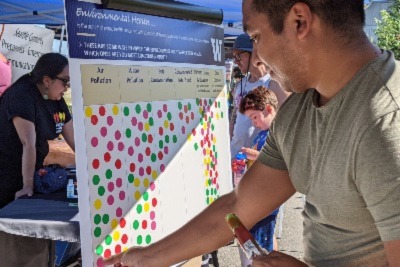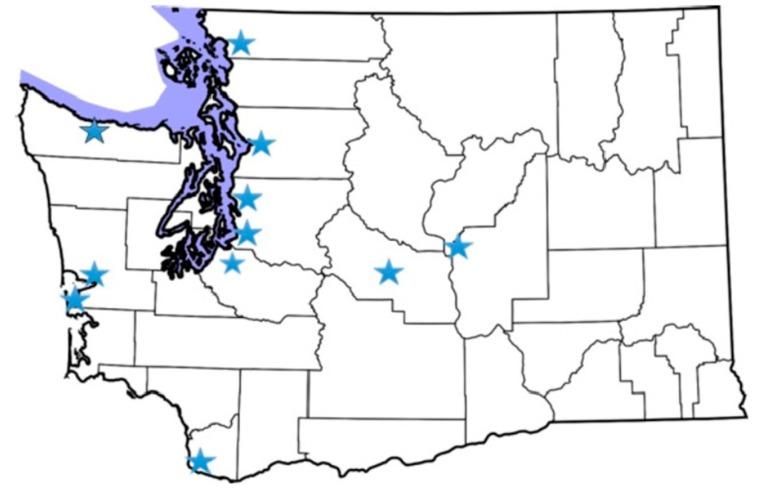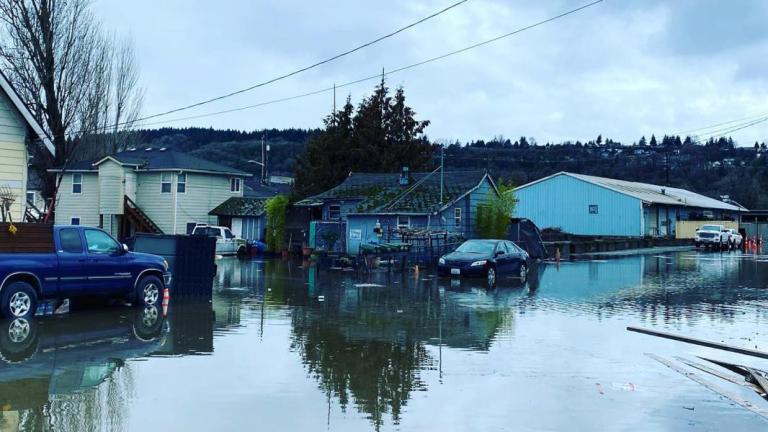
The Community Engaged Research Hub (CEnR Hub) connects environmental health researchers at the University of Washington (UW) with community-based and governmental organizations and in Washington to advance environmental health, equity, and justice.
The purpose of the CEnR Hub is to assist researchers in responding to environmental health (EH) challenges in communities through equitable community-academic partnerships. The CEnR Hub is an initiative of UW’s Center for Exposures, Diseases, Genomics and Environment (EDGE Center) and is managed by the Center’s Community Engagement Core (CEC).
Where We Work
The CEnR Hub works with UW researchers and community-based organizations in urban, rural, and tribal communities in Washington State. During the Hub's pilot years (2020-23) we worked primarily in the Duwamish Valley in South Seattle and the Methow Valley in North Central Washington. Our service area is now statewide (within the capacity limitations of the EDGE Center's Community Engagement Core).

Statewide projects
Community Partners
The UW Department of Environmental & Occupational Health Sciences (DEOHS) and the EDGE Center have partnered with community-based organizations in Washington State for over a decade. Past projects include a Cumulative Health Impacts Assessment for the Duwamish Valley (2013) and a Health Impact Assessment of EPA’s Proposed Cleanup Plan for the Duwamish River Superfund Site (2013).
Since beginning to develop the CEnR Hub in 2020, the EDGE CEC has responded to community-initiated research and research translation requests by:
- Supporting a study highlighting disparities in COVID-19 positivity and testing in South King County
- Creating videos in nine languages providing COVID-19 public health guidance
- Hosting an Aviation Impacts Solutions Summit to address ultrafine particle (UFP) pollution in airport-adjacent communities
- Compiling information and data sources to create a Duwamish Valley Clean Air Storymap
- Developing a “5th Season” interactive display and podcast about the health effects of wildfire smoke in Okanogan County
- Partnering with community organizations and public agencies to conduct community surveys about climate change preparedness and resilience in the Duwamish Valley, and
- Facilitating a research partnership between UW public health investigators and the Duwamish River Community Coalition that led to a NIEHS supported 5-year childhood asthma intervention study that launched in 2023
Current and past community and agency partners include:
- Duwamish River Cleanup Coalition
- Duwamish Valley Youth Corps
- Just Health Action
- Methow Valley Citizens Council
- Clean Air Methow
- Pine Creek Community Long-Term Recovery Organization
- Public Health–Seattle & King County
- Puget Sound Clean Air Agency
- Puget Soundkeeper Alliance
- Quinault Indian Nation
- U.S. Centers for Disease Control and Prevention
- U.S. Forest Service
- Washington State Department of Health
 The UW EDGE Center has developed a Model Community Partnership Agreement in collaboration with our community partners and UW researchers who seek to use community-engaged (CEnR) and community-based participatory research (CBPR) approaches to studying environmental health issues.
The UW EDGE Center has developed a Model Community Partnership Agreement in collaboration with our community partners and UW researchers who seek to use community-engaged (CEnR) and community-based participatory research (CBPR) approaches to studying environmental health issues.
Use the link below to access a PDF of the Model Community Partnership Agreement for the UW School of Public Health.
Get Involved
UW researchers and community-based organizations can submit research request or interest forms on a rolling basis for projects addressing topics such as:
- Industrial, transportation, or public utility emissions
- Air, soil, water quality, or sediment exposures
- Environmental health exposures
- Environmental justice considerations or health disparities
- Health interventions or exposure reduction strategies
- Other relevant EH research or research translation/science communication projects
The EDGE Center’s CEC will then seek to match research questions with UW researchers or community-based organizations and facilitate the development of collaborative, community-engaged research strategies that serve the self-identified needs of the community and advance the investigators’ career development. A monthly digest of research requests will be circulated to interested community organizations and university researchers.
Financial resources from the EDGE Center for resulting research projects are not available (unless independently funded through a competitive EDGE Center Pilot Grant), but the EDGE CEC can help identify potential funding sources and, in some cases, provide limited in kind support.



